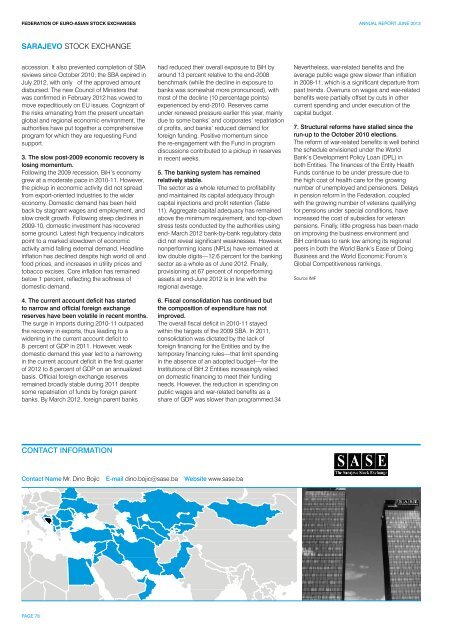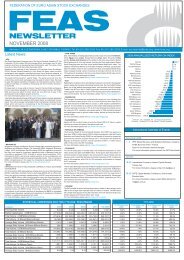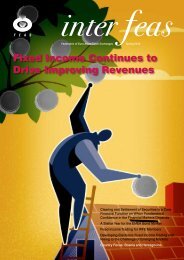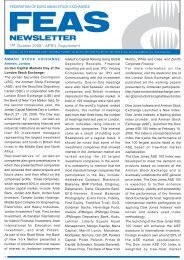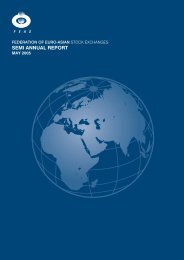JUNE 2013 - FEAS
JUNE 2013 - FEAS
JUNE 2013 - FEAS
Create successful ePaper yourself
Turn your PDF publications into a flip-book with our unique Google optimized e-Paper software.
FEDERATION OF EURO-ASIAN STOCK EXCHANGES ANNUAL REPORT <strong>JUNE</strong> <strong>2013</strong><br />
SARAJEVO STOCK EXCHANGE<br />
accession. It also prevented completion of SBA<br />
reviews since October 2010; the SBA expired in<br />
July 2012, with only ⅓ of the approved amount<br />
disbursed. The new Council of Ministers that<br />
was confirmed in February 2012 has vowed to<br />
move expeditiously on EU issues. Cognizant of<br />
the risks emanating from the present uncertain<br />
global and regional economic environment, the<br />
authorities have put together a comprehensive<br />
program for which they are requesting Fund<br />
support.<br />
3. The slow post-2009 economic recovery is<br />
losing momentum.<br />
Following the 2009 recession, BiH’s economy<br />
grew at a moderate pace in 2010-11. However,<br />
the pickup in economic activity did not spread<br />
from export-oriented industries to the wider<br />
economy. Domestic demand has been held<br />
back by stagnant wages and employment, and<br />
slow credit growth. Following steep declines in<br />
2009-10, domestic investment has recovered<br />
some ground. Latest high frequency indicators<br />
point to a marked slowdown of economic<br />
activity amid falling external demand. Headline<br />
inflation has declined despite high world oil and<br />
food prices, and increases in utility prices and<br />
tobacco excises. Core inflation has remained<br />
below 1 percent, reflecting the softness of<br />
domestic demand.<br />
4. The current account deficit has started<br />
to narrow and official foreign exchange<br />
reserves have been volatile in recent months.<br />
The surge in imports during 2010-11 outpaced<br />
the recovery in exports, thus leading to a<br />
widening in the current account deficit to<br />
8¾ percent of GDP in 2011. However, weak<br />
domestic demand this year led to a narrowing<br />
in the current account deficit in the first quarter<br />
of 2012 to 8 percent of GDP on an annualized<br />
basis. Official foreign exchange reserves<br />
remained broadly stable during 2011 despite<br />
some repatriation of funds by foreign parent<br />
banks. By March 2012, foreign parent banks<br />
had reduced their overall exposure to BiH by<br />
around 13 percent relative to the end-2008<br />
benchmark (while the decline in exposure to<br />
banks was somewhat more pronounced), with<br />
most of the decline (10 percentage points)<br />
experienced by end-2010. Reserves came<br />
under renewed pressure earlier this year, mainly<br />
due to some banks’ and corporates’ repatriation<br />
of profits, and banks’ reduced demand for<br />
foreign funding. Positive momentum since<br />
the re-engagement with the Fund in program<br />
discussions contributed to a pickup in reserves<br />
in recent weeks.<br />
5. The banking system has remained<br />
relatively stable.<br />
The sector as a whole returned to profitability<br />
and maintained its capital adequacy through<br />
capital injections and profit retention (Table<br />
11). Aggregate capital adequacy has remained<br />
above the minimum requirement, and top-down<br />
stress tests conducted by the authorities using<br />
end- March 2012 bank-by-bank regulatory data<br />
did not reveal significant weaknesses. However,<br />
nonperforming loans (NPLs) have remained at<br />
low double digits—12.6 percent for the banking<br />
sector as a whole as of June 2012. Finally,<br />
provisioning at 67 percent of nonperforming<br />
assets at end-June 2012 is in line with the<br />
regional average.<br />
6. Fiscal consolidation has continued but<br />
the composition of expenditure has not<br />
improved.<br />
The overall fiscal deficit in 2010-11 stayed<br />
within the targets of the 2009 SBA. In 2011,<br />
consolidation was dictated by the lack of<br />
foreign financing for the Entities and by the<br />
temporary financing rules—that limit spending<br />
in the absence of an adopted budget—for the<br />
Institutions of BiH.2 Entities increasingly relied<br />
on domestic financing to meet their funding<br />
needs. However, the reduction in spending on<br />
public wages and war-related benefits as a<br />
share of GDP was slower than programmed.34<br />
Nevertheless, war-related benefits and the<br />
average public wage grew slower than inflation<br />
in 2008-11, which is a significant departure from<br />
past trends. Overruns on wages and war-related<br />
benefits were partially offset by cuts in other<br />
current spending and under execution of the<br />
capital budget.<br />
7. Structural reforms have stalled since the<br />
run-up to the October 2010 elections.<br />
The reform of war-related benefits is well behind<br />
the schedule envisioned under the World<br />
Bank’s Development Policy Loan (DPL) in<br />
both Entities. The finances of the Entity Health<br />
Funds continue to be under pressure due to<br />
the high cost of health care for the growing<br />
number of unemployed and pensioners. Delays<br />
in pension reform in the Federation, coupled<br />
with the growing number of veterans qualifying<br />
for pensions under special conditions, have<br />
increased the cost of subsidies for veteran<br />
pensions. Finally, little progress has been made<br />
on improving the business environment and<br />
BiH continues to rank low among its regional<br />
peers in both the World Bank’s Ease of Doing<br />
Business and the World Economic Forum’s<br />
Global Competitiveness rankings.<br />
Source IMF<br />
CONTACT INFORMATION<br />
Contact Name Mr. Dino Bojic E-mail dino.bojic@sase.ba Website www.sase.ba<br />
PAGE 78


